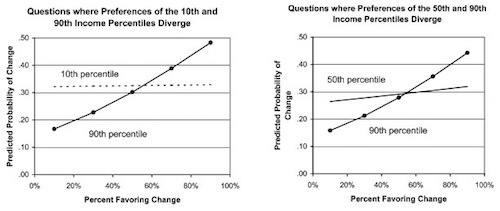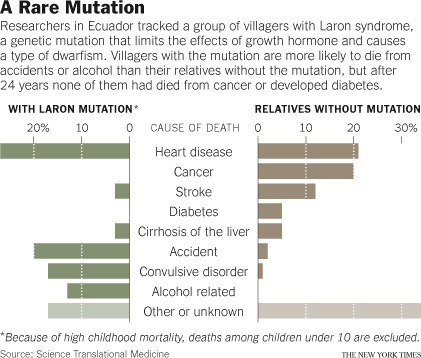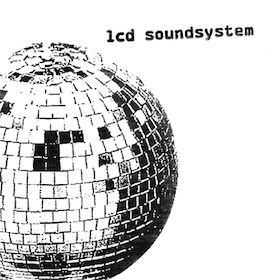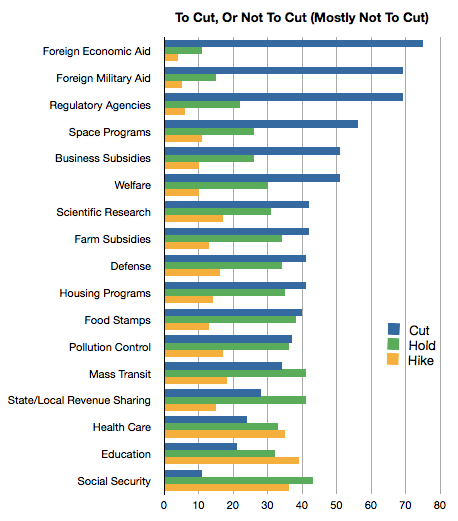Matthew Yglesias's Blog, page 2417
February 17, 2011
The Ugly Truth

Chris Christie is a Republican statewide elected official in New Jersey. New Jersey is the second-richest state in the union, but it's also quite progressive on cultural matters. Consequently, what one would expect from a Republican politician achieving some measure of political success in New Jersey is a fanatical commitment to the interests of wealthy people. So when Chris Christie delivers a speech and says "You're going to have to raise the retirement age for Social Security" I'm not surprised. This is unquestionably the policy option that best serves the interests of high-income New Jerseyites.
But given journalists role to comfort the afflicted and afflict the comfortable, I'm surprised to see Dana Milbank of The Washington Post offer this as an example of the following:
But his physique also works to his advantage by reinforcing Christie's appeal as something other than the blow-dried politician who says whatever the voters want to hear. Christie isn't pretty, and he tells ugly truths.
For "you're going to have to raise the retirement age for Social Security" to count as an "ugly truth" assumes that it's true. And yet it's not true. Closing the projected actuarial gap in Social Security requires some combination of more immigration, higher taxes, and lower benefits. Relative to higher taxes, lower benefits tend to be preferred by richer people. And of all the different ways to reduce benefits, raising the retirement age is the one that does the most to punish the poor and demands the least sacrifice from the rich. Christie, it's true, isn't saying "whatever the voters want to hear" but he's not telling the truth either. What he's doing is saying what rich people want middle class people to believe.
The particularly confusing thing, though, isn't that Christie lied but that I read in The Washington Post that Christie's lie is the truth. Doubly confusing is that I read a Washington Post article a few months ago by Ezra Klein that laid this out pretty clearly describing a "conversation in Washington, where affluent people who like their jobs propose cutting benefits for the poor (which is, after all, what raising the retirement age would do) rather than lowering benefits or increasing the payroll tax on, well, themselves."


Urban Planning in South Sudan
Southern Sudan, the world's newest country, seems to me to be off to a bad start with its urban planning concepts:

And:

I don't think you necessarily want too much "planning" of a growing city at all. I'd like to see land used roughly as densely as market conditions warrant. But laying out street grids and such is necessary, and the goal should be to create a large number of relatively small streets—short blocks are good for walking, bicycling, etc. That kind of thing is especially important in poor countries; urban design that privileges the car is very bad for people who can't afford one.


Government By The Rich
Via Kevin Drum, a Martin Gilens paper (PDF) on the most important fact about inequality and American politics—when rich people and average folks disagree, rich people always get their way:

I actually sort of disagree with Gilens and Drum that "the most obvious source of influence over policy that distinguishes high-income Americans is money." I would say the most obvious mechanism here is socialization. The president, the senior White House staff, the cabinet secretaries, the senators, the House members, the senior congressional staff, and the lobbyists, association heads, business executives, governors, mayors, foreign officials, and media celebrities who they interact with are all personally pretty high income. You get into the top decile of the US income distribution with a household income of $138,000, so the entire congress is in the top ten percent. What's more, political elites tend to have college roommates, siblings, in-laws, etc. who are also prosperous.
Obviously the fact that rich people have money to spend on politics doesn't hurt either. But I would never underestimate the human desire to believe that one is doing the right thing, and thus the importance of socialization to determining bias. Nobody in Washington seems to know that the public is clamoring for higher Social Security benefits and more federal spending on health and education largely, I think, because this isn't what the people they know personally are clamoring for.


One Man's Health Care Costs Are Another Man's Way Of Earning A Living
Nicholas Wade reports a fascinating story about a Ecuadoran villagers with a rare genetic abnormality that makes them very short but also seems to grant extraordinarily low rates of various illnesses.

Of course, if I had a dime for every promising-looking breakthrough in medical science that didn't pan out in the end I'd be rich. But what if it does pan out?
That reminded me of some recent posts from Steve Randy Waldman and Ryan Avent that seemed to me to be walking up toward a Marx-style theory of overproduction, crisis, and the collapse of capitalism. Like suppose scientists did come up with a pill that grants you good health up to the year 100, at which point you quickly and painlessly drop dead. I'd take a pill like that. and I bet most everyone would join me. The short-term result would be . . . catastrophic economic collapse as the bulk of the health care sector is rendered obsolete.
Which in turn is a reminder that while it's easy to talk about "controlling health care costs" in practice these "costs" are also known as "income" for a lot of people. The Internet has allowed for a revolution in reducing newspaper article distribution costs, also known as the collapse of the bulk of the American newspaper industry. Anything that works in a really radical way to make health care cheaper would create serious problems for lots of people and lots of firms and thus prompt fierce resistance.


The Price of Life

A reminder that a certain level of arbitrariness invariably creeps into any cost-benefit calculus comes from Binyamin Applebaum's article on how Obama-era regulatory agencies tend to value life more than did its Bush-era predecessors (also a reminder that partisan control of the White House matters in a lot of below-the-radar ways). The interesting thing is that the US government as a whole doesn't have a consistent line on this:
The Environmental Protection Agency set the value of a life at $9.1 million last year in proposing tighter restrictions on air pollution. The agency used numbers as low as $6.8 million during the George W. Bush administration. The Food and Drug Administration declared that life was worth $7.9 million last year, up from $5 million in 2008, in proposing warning labels on cigarette packages featuring images of cancer victims. The Transportation Department has used values of around $6 million to justify several recent decisions to impose regulations that the Bush administration had rejected as too expensive, like requiring stronger roofs on cars.
The gap between the EPA and the DOT is downright gigantic. It amounts to running a buy two get one free sale on human life in transportation-related mishaps. Meanwhile, I would say the case that we're overemphasizing terrorism as a problem is basically sealed by the fact that "A report last year financed by the Department of Homeland Security suggested that the value of preventing deaths from terrorism might be 100 percent higher than other deaths." We should not let 1,000 people die in car accidents or of pollution-related illness in order to prevent a terrorism from killing ten people somewhere. Violent murder is awful, and we should try to stop it, but having your husband die in a construction mishap or your wife be killed a drunk driver is also awful.
Meanwhile note that while there certainly are misguided regulations in this country, it's not like what the business community wants is to rescind a couple dumb rules and streamline things. They're very upset about the higher valuation of human life, because their goal is to maximize profit by any means necessary up to and including getting people killed.


February 16, 2011
Endgame
I'll tell you what I know:
— GOP looking to find a way to "tackle entitlements" strictly by screwing over the poor.
— Fed forecasting slightly faster growth.
— I'm all for a higher inflation target.
— Taxes and incentives.
— "Creating Subsidized Employment Opportunities for Low-Income Parents".
In honor of efficient allocation, Belle & Sebastian "For The Price of a Cup of Tea".


Emergency Room Dilemma

Doctor Katherine Fullerton, a pediatric emergency physician, describes a dilemma she dealt with on a daily basis until quite recently:
Our [Electronic Medical Record] and record of past medical problems is a wonderful asset when I'm treating a sick child. Often the families are stressed, and forget many of the pertinent details, and this way nothing is missed. But could this same EMR be a barrier for these children when they become young adults and are trying to obtain their own insurance? Could the adorable 3 year old who is wheezing in room three, have been denied insurance as an adult because I wrote in the medical record that she has asthma? Will the six-year old hemophiliac in room five who is bleeding from a minor abrasion after wrestling with his cousin be denied insurance when he's reached adulthood?
That's a difficult problem. A doctor wants to treat a patient in the best way possible, but a doctor also doesn't want to compromise the patient's long-term health by taking steps that will make it hard for the patient to get treatment in the future. But there's good news:
I am thankful that because of the health reform law, they can no longer be denied insurance for a pre-existing condition. With the new law, I do not have to worry that my careful history taking will harm their future.
Treatment of patients is best done in the context of maximum possible information about a patient's health status. But this kind of disclosure has perverse consequences when it comes to insurance underwriting. Over time, we'll presumably have technological improvements that allow us to read more relevant information off a person via genetic analysis. From a health standpoint, we'll want to be able to do that. But we'll only be able to apply this technology in value-adding ways if we move forward with ACA-style reforms of the insurance industry or else its supplantation with something more like Medicare.


Alternatives to Inefficient Ticket Pricing

As history's greatest monster, I've long been disturbed by good bands' aversion to efficient demand-based pricing for their shows. Annie Lowrey's article about LCD Soundsystem's anti-scalper efforts is confirming my priors:
But LCD fans were not left out in the cold. The debacle attracted the wrath of the band's charismatic front man, James Murphy. On LCD Soundsystem's blog, he wrote: "this here is just to say that we were more than taken aback and surprised about the speed of ticket sales for the april 2nd MSG gig, as well as the effectiveness of scalper pieces of fucking shit at getting their hands on said tickets before fans could, and it's knocked us on our asses."
The market had failed in his mind. He told fans not to pay thousands of dollars to get into the Madison Square Garden show: "I will try to figure a way out to fuck these fuckers. NO MATTER WHAT WE DO, IT IS NOT WORTH THAT KIND OF MONEY TO SEE US!" Soon enough, he realized he had an ace up his sleeve. He flooded the market, adding shows, upping ticket supply, and hopefully pushing prices down. (Those shows will go on sale this Friday.)
This is my current understanding of the dilemma. Optimal allocation of LCD Soundsystem tickets requires demand-responsive ticket pricing. But good rock bands are not composed of narrow-minded amoral profit-maximizers. Consequently, they're motivated to price tickets at a lower level than the market will bear leading, in turn, to middlemen getting the rents. What's needed is a way for bands to price tickets at demand-responsive levels in a way that's consistent with the norm that the guys in a cool band shouldn't be narrow-minded profit-maximizers. The best solution here, I think, is charity.
Someone (Bono?) needs to set up a trust fund to which bands will allocate the excess revenues that accumulate when the market price of concert tickets exceeds the "fair" price as determined by the bands' moral intuitions. In that case, instead of a situation where "[t]ickets with a face value of $49.50 were going for 12 times that" on a secondary market you'd have a scenario where tickets are going for $500 and $450 out of that goes to the trust fund. The fund could take the money and give it to poor people in Africa and India. They need the money a good deal more than LCD Soundsystem fans do. You could say, very legitimately, "it's too bad that not every fan can see the show, but we need some allocation mechanism, and I've tried to pick the one that will do the world the most good." Hopefully Jeff Sachs would vouch for the plan.


Efficiency And Progress Are Ours Once More

Sallie James on House Republicans' spending priorities:
The administration's proposal would affect only about 2 percent of the total recipients of direct payments — subsidies that flow every year regardless of prices or farm output to owners of land that may or may not still be used for farming — and it does not by any means go far enough. But at least it is a start.
On the other side of the aisle, the Republicans followed their Republican Study Committee colleagues in failing to propose any cuts to "farm subsidies" as we typically understand them in their FY2011 budget proposal. To be sure, 22 percent of the $60 billion in cuts they propose would come from the "agriculture function," and they indeed get rid of entire programs, but they are mainly to the nutrition and conservation areas of the USDA's responsibilities. Nothing, so far as I can tell, from the commodity programs.
Money for rich landowners, but not enough for poor kids. It's a problem of bad morals.


The Limited Appetite For Budget Cuts
Harris Interactive has done another one of those polls about how almost all real spending cuts are unpopular. I worked it up into graphical form:

One important thing to note here is that people's views seem to be swayed a lot by description. Cutting "welfare" is wildly more popular than cutting "food stamps" and I absolutely refuse to believe that's because of some nuanced understanding of the differences between TANF and SNAP. Similarly, people like "pollution control" but hate "regulatory agencies," which is the people who do the pollution controlling.


Matthew Yglesias's Blog
- Matthew Yglesias's profile
- 72 followers



